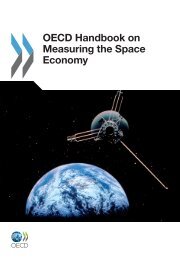Evaluating Country Programmes - OECD Online Bookshop
Evaluating Country Programmes - OECD Online Bookshop
Evaluating Country Programmes - OECD Online Bookshop
You also want an ePaper? Increase the reach of your titles
YUMPU automatically turns print PDFs into web optimized ePapers that Google loves.
<strong>OECD</strong> 1999<br />
<strong>Country</strong> Assistance Strategies as a Management and Evaluation Instrument for Donors<br />
– Instrument for internal co-ordination: The country concepts serve to link the instruments<br />
of financial and technical co-operation (implemented by different<br />
agencies), with a view to realising a coherent development co-operation<br />
approach. A distinction is made between two stages of internal co ordination:<br />
as mentioned before, the country concepts are mandatory for governmental<br />
development co-operation and serve as an orientation for non-governmental<br />
development co-operation.<br />
– Basis for external co-ordination: “The country concepts also constitute the basis<br />
for our influence on and co-ordination with the country-specific programmes<br />
of other donors, in particular the EU and the World Bank.”<br />
– Basis for policy dialogue with the partner governments.<br />
– Information instrument that serves the “transparency of country-specific development-related<br />
decisions taken by the BMZ.”<br />
Some results of the evaluation of country concepts<br />
In 1996/97, the instrument “country concept” was scrutinised through the evaluation<br />
of nine country concepts. It was found that the country concepts had engendered<br />
various positive effects:<br />
– In a number of cases they contributed to focusing the German development<br />
co-operation on priority areas, thereby reducing the fragmentation of<br />
projects.<br />
– In this way they enhanced the continuity and reliability of Germany’s development-co-operation<br />
contribution and German professionalism and ability<br />
to engage in dialogue with partner countries and other donors.<br />
– The country concepts constitute a frame of reference that has made it easier<br />
to reject project proposals or applications outside the priority areas specified<br />
in a country concept.<br />
– Finally, they provide a basis for discussion for the various German governmental<br />
and non-governmental development co-operation institutions active<br />
in a given partner country.<br />
However, the evaluation made it clear that the desired effect of country concepts<br />
has not materialised in all cases. Proceeding on the guidelines established<br />
by the BMZ for the country concepts, the preparation and use of country concepts<br />
involves three crucial steps:<br />
– Identification of “a very limited number” of priority areas on which German<br />
development co-operation is to concentrate, taking into account the partner<br />
country’s core problems, development potential and framework conditions<br />
as well as the experience made so far by German development co-operation<br />
and its general development policy goals.<br />
193

















![CQE=U]^\]Z: KAZAKHSTAN - OECD Online Bookshop](https://img.yumpu.com/3915768/1/190x253/cqeuz-kazakhstan-oecd-online-bookshop.jpg?quality=85)